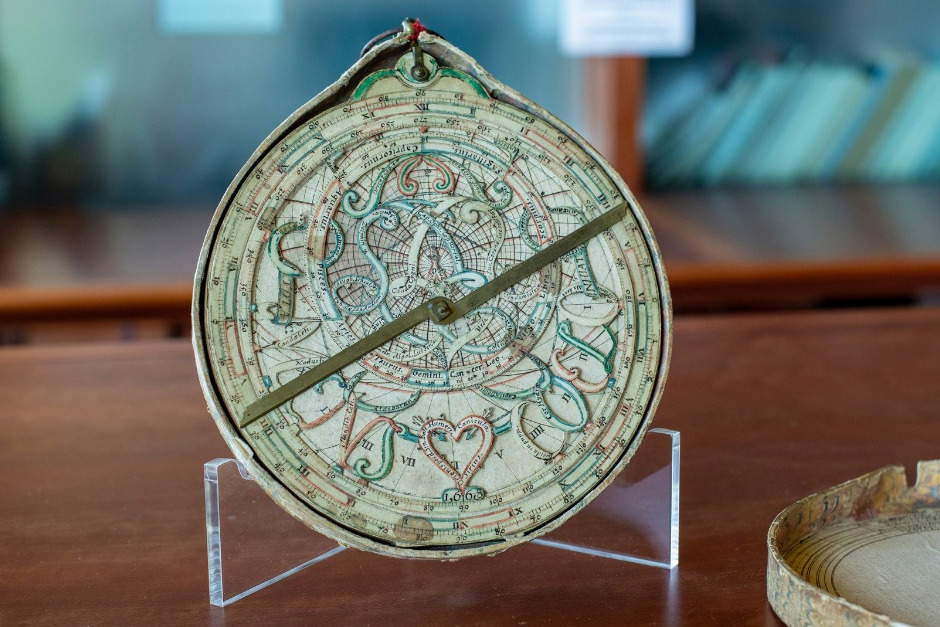Museo Galileo in Florence presented two valuable scientific instruments that were recently purchased by the Ministry of Culture for the benefit of the Regional Directorate of Museums of Tuscany, which deposited them at Museo Galileo. The Museum itself provided the scientific advice that attested to their great value as historical-scientific documents. They are Cornelis De Jode’s terrestrial globe, a very rare specimen of historical cartography, dating from 1594, from Antwerp, and the paper astrolabe, dated 1668, possibly from northern France: both are now on display at Museo Galileo in a showcase dedicated to highlighting new acquisitions, placed in a room on the renovated ground floor, together with another object acquired by the Ministry of Culture in 2022, namely a Gregorian reflecting telescope by Le Bas Jr. (c. 1720). Subsequently, these instruments will be transferred to the Florentine museum’s exhibition itinerary. Present at the presentation were Stefano Casciu, regional director museums of Tuscany, Roberto Ferrari, executive director of Museo Galileo, and Simonetta Brandolini d’Adda, president of Friends of Florence, whose generous contribution enabled the restoration of Cornelis De Jode’s globe.
Cornelis De Jode’s globe is dated 1594 and comes from Antwerp. Appearing on the market in 2016 and then restricted, its purchase was finalized by the Ministry of Culture in November 2022, for the sum of 385,568 euros. It is a very rare object of great value in the field of historical cartography, as it is the only survivor of the production of the Flemish cartographer and printer Cornelis De Jode (c. 1568-1600), which until now has been witnessed exclusively by a series of cartographic spindles preserved at the Bibliothèque nationale de France in Paris. The globe was in critical condition and showed strong signs of deterioration, including some gaps in the paper surface. After careful diagnostic investigations, it underwent a delicate and complex cleaning and restoration operation, funded by the Friends of Florence foundation. The intervention was carried out by Officina del Restauro of Florence. The restoration work was directed by Stefano Casciu with the collaboration of the Restoration Officer of the Regional Museums Directorate Lucia Nucci, and with the further supervision - for historical-scientific aspects - of Giorgio Strano, head of the Museo Galileo collections. After a period of display in the showcase dedicated to enhancing new acquisitions, Cornelis De Jode’s terrestrial globe will be permanently placed in the Museo Galileo’s permanent exhibition, significantly complementing the conspicuous and important selection of terrestrial and celestial globes.
Possibly of French manufacture, the manuscript planispheric astrolabe is made of paper and wood and comes complete with a case. An export request for this instrument had been forwarded to the Soprintendenza Archeologica Belle Arti e Paesaggio for the Metropolitan City of Milan by its owner, but, considering its significant historical and scientific interest, the Ministry of Culture denied its export and purchased it for the benefit of the Regional Directorate of Museums of Tuscany, allocating it to the Museo Galileo. The sundial on the back of the instrument shows a latitude of 49°30’, suggesting a context of use for the far north of France or, more likely, Bavaria (Nuremberg, at 49°27’ N, was well known for instrument-making). The date 1668 is consistent with the spelling of the inscriptions. The scientific care in the making is high; the graduated scales are drawn with great precision. The date of the spring equinox is ideally set at March 21, which brings us back to a Catholic sphere, compatible with both northern France and Bavaria (within which the enclave of Nuremberg was an exception: the Gregorian calendar was officially adopted there in 1699). This is an object of significant scientific-historical interest and extremely rare: there are very few manuscript flat astrolabes on paper or card prior to the 18th century. The Museo Galileo, for example, has only a few fragments of it dated to the 17th century.
Pictured is the manuscript plane astrolabe.
 |
| Florence's Museo Galileo is enriched with two valuable scientific instruments |
Warning: the translation into English of the original Italian article was created using automatic tools. We undertake to review all articles, but we do not guarantee the total absence of inaccuracies in the translation due to the program. You can find the original by clicking on the ITA button. If you find any mistake,please contact us.